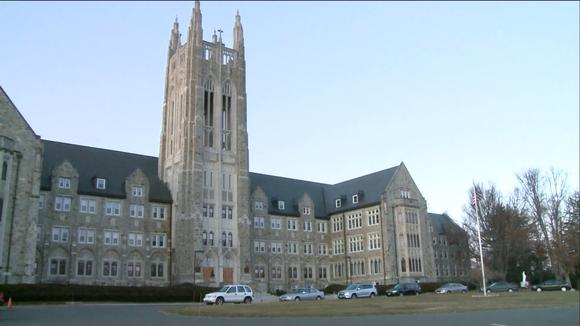Church Uses Skakel Case to Push for Reversal of Law That AIDS Sex-abuse Accusers
By Dave Altimari
Archdiocese of Hartford attorneys used the case of Kennedy cousin Michael Skakel to argue Monday before the state Supreme Court that a revision to a state law that lengthened the time a sexual-abuse accuser can file a lawsuit should be overturned. Wesley Horton told the panel of seven justices that Skakel's case, which came before the court a few years ago, was a relevant example of the church's issue with the state law. "Remember the Skakel case where this court said you can't apply a statute of limitations retroactively after it has expired because it impacts the defendants rights," Horton told the justices. The diocese is appealing a $1 million jury verdict from last February in which the accuser, identified in court papers as Jacob Doe, testified that he and another friend were repeatedly sexually assaulted by the Rev. Ivan Ferguson and a friend of the priest from 1981-1983. The diocese also wants the court to overturn the verdict. The victim was allowed to file that lawsuit because in 2002 the state legislature voted to extend the statute of limitations for civil cases on sexual assault claims to 30 years from when a complainant reaches 18. It had first been amended in 1991 to 17 years. The 2002 change was retroactive. In its 56-page legal brief, the diocese's attorneys claim that under the original law, Jacob Doe would have had until 1988 to file a lawsuit, and that even after the measure was amended in 1991, the plaintiff's right to file a lawsuit would have expired in 2003. In a 2006 case involving Skakel's murder conviction, the court said the only exceptions to statute of limitations on criminal cases would be if a statute of limitations had already passed by the time any amendment to the law took effect. The diocese is arguing that it was only after the statute was changed again that the plaintiff was able to file the lawsuit, a situation that is unconstitutional and unfair to the church or any other institution. Horton said even though the Ferguson judgment was a civil matter, and not criminal like the Skakel murder case, the premise is the same – when the statute of limitations ran out in this case in 1988 the church had the substantiated right not to have it reviewed again. The church's other arguments for overturning the verdict included questioning whether the trial judge should have allowed part of a deposition by Ferguson into evidence and whether the judge erred by not allowing the diocese to call an expert witness to explain to the jury how priest sexual abuse cases were treated more than 30 years ago. Church attorney Jack Sitarz argued that not many cases that are 30-40 years old ever go to trial and that the church was at a disadvantage because the "jurors could use 20/20 hindsight" on the case impacting their verdict. But before Sitarz got far Chief Justice Chase Rogers questioned the premise of the argument that jurors in 1981 wouldn't have known that alcoholism and pedophilia could be connected and more importantly could reoccur. "Why would an ordinary person in 1981 not be able to make a reasonable inference that a person had alcohol problem and pedophilia issue and could once again?" Rogers said. Sitarz responded that "now we take a one strike and you're out approach but back then you could see that wasn't the case." "The knowledge about pedophilia and the treatment of pedophilia has changed significantly from 40 years ago. It is like night and day," Sitarz said. Attorney Hugh D. Hughes, who represented Jacob Doe, said the jury was entitled to hear that the church had failed to supervise Ferguson. "The defendant in effect crossed their fingers and looked the other way," Hughes said. "They understood from Day 1 the seriousness of this issue and turned a blind eye." The diocese was first made aware of Ferguson's abuse by a phone call in 1979. At the time, Ferguson was a teacher at Northwest Catholic High School in West Hartford. At the trial, testimony showed that when former Archbishop John F. Whealon confronted him about the 1979 allegation, Ferguson admitted to the abuse. Ferguson was sent to a treatment facility in Massachusetts. Two years later, Whealon appointed Ferguson priest director of a Derby school. Ferguson and his friend were accused of abusing Doe and his childhood friend at, among other places, the rectory to which Ferguson had been reassigned in Derby. At the time of the abuse, from 1981 to 1983, the boys attended the school. Ferguson died in 2002.
|
.
Any original material on these pages is copyright © BishopAccountability.org 2004. Reproduce freely with attribution.
